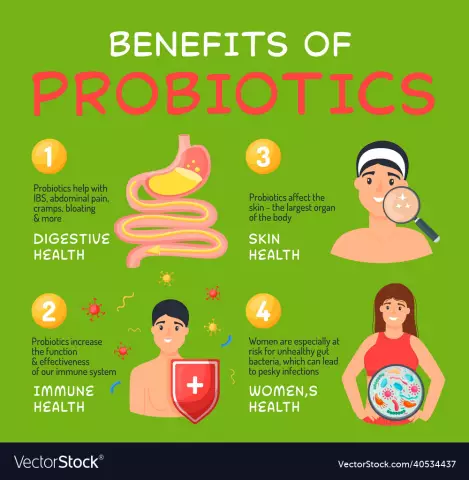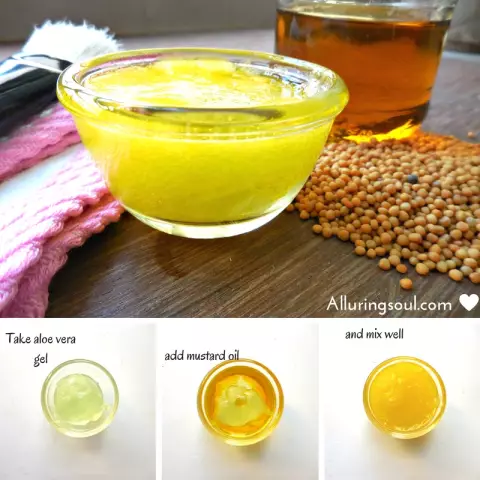- Author Rachel Wainwright [email protected].
- Public 2023-12-15 07:39.
- Last modified 2025-11-02 20:14.
Vicks AntiGripp COMPLEX
Vicks AntiGripp COMPLEX: instructions for use and reviews
- 1. Release form and composition
- 2. Pharmacological properties
- 3. Indications for use
- 4. Contraindications
- 5. Method of application and dosage
- 6. Side effects
- 7. Overdose
- 8. Special instructions
- 9. Application during pregnancy and lactation
- 10. Use in childhood
- 11. In case of impaired renal function
- 12. For violations of liver function
- 13. Use in the elderly
- 14. Drug interactions
- 15. Analogs
- 16. Terms and conditions of storage
- 17. Terms of dispensing from pharmacies
- 18. Reviews
- 19. Price in pharmacies
Latin name: Vicks AntiGrip COMPLEX
ATX code: N02BE51
Active ingredient: paracetamol (Paracetamol) + guaifenesin (Guaifenesin) + phenylephrine (Phenylephrine)
Manufacturer: Wrafton Laboratories, Limited (UK)
Description and photo update: 2019-11-07
Prices in pharmacies: from 258 rubles.
Buy

Vicks AntiGripp COMPLEX is a combined drug for the symptomatic treatment of acute respiratory diseases (ARI) and colds, has analgesic, antipyretic, expectorant and decongestant effects.
Release form and composition
The drug is produced in the form of a powder for preparation of a solution for oral administration: a fine-crystalline mass with a homogeneous structure, from almost white to white with a gray or yellow tint, has a smell characteristic of lemon and menthol [4.36 g each in laminated sachets (paper | polyethylene | aluminum foil | polyethylene or Surlyn), in a cardboard box 5 or 10 sachets and instructions for use Vicks AntiGripp COMPLEX].
Composition of Vicks AntiGripp COMPLEX for 1 sachet:
- active ingredients: paracetamol - 500 mg, guaifenesin - 200 mg, phenylephrine hydrochloride - 10 mg;
- auxiliary components: aspartame, sucrose, sodium cyclamate, tartaric acid, sodium citrate, citric acid, potassium acesulfame, menthol flavor, lemon juice flavor, lemon flavor 8476, quinoline yellow dye.
Pharmacological properties
Pharmacodynamics
Vicks AntiGripp COMPLEX is a combined drug designed to treat symptoms of acute respiratory infections and colds. Its therapeutic effect is due to the following properties of the active ingredients:
- paracetamol: has a pronounced analgesic (non-narcotic) and antipyretic effect;
- guaifenesin: provides the drug with an expectorant effect. The mucokinetic activity of guaifenesin promotes the transition of an unproductive cough into a productive cough, facilitating the removal of sputum from the bronchi;
- phenylephrine: a sympathomimetic with a pronounced vasoconstrictor effect. The alpha-adrenergic activity of phenylephrine causes vasoconstriction in the nasal cavity, eliminating mucosal edema and hyperemia.
Pharmacokinetics
After taking Vicks AntiGripp COMPLEX inside, paracetamol is almost completely rapidly absorbed from the gastrointestinal tract (GIT). Its maximum concentration (C max) in plasma is reached within 10-60 minutes.
Paracetamol is metabolized in the liver. It is excreted through the kidneys, mainly in the form of sulfate compounds and glucuronides. The half-life (T 1/2) is from 1 to 3 hours.
After ingestion, guaifenesin is absorbed from the gastrointestinal tract after 30 minutes. Its metabolism takes place in the liver by oxidation to β- (2 methioxyphenoxy) lactic acid. It is excreted by the kidneys in the form of inactive metabolites and with sputum through the lungs. T 1/2 of guaifenesin is 1 hour.
With oral administration, the bioavailability of phenylephrine decreases. It has an irregular absorption from the gastrointestinal tract, is exposed to monoamine oxidase in the intestine and liver at the first stage of metabolism. C max phenylephrine in plasma is reached after 1-2 hours, T 1/2 is 02.03 hours. It is excreted in the urine in the form of sulfate compounds.
Indications for use
The use of Vicks AntiFlu COMPLEX is indicated for the appearance of symptoms of flu and colds such as fever, sore throat, headache, nasal congestion, pain in the body and limbs, and an unproductive cough.
Contraindications
Absolute:
- impaired liver function;
- porphyria;
- severe chronic renal failure;
- hyperthyroidism;
- diabetes;
- phenylketonuria;
- arterial hypertension;
- tachyarrhythmia;
- ischemic heart disease, including acute myocardial infarction, atherosclerosis of the coronary arteries;
- aortic stenosis;
- acute period of gastric ulcer and duodenal ulcer;
- angle-closure glaucoma;
- pheochromocytoma;
- deficiency of sucrase or isomaltase, glucose-galactose malabsorption syndrome, fructose intolerance;
- hyperplasia of the prostate;
- concomitant therapy with beta-blockers, tricyclic antidepressants, monoamine oxidase (MAO) inhibitors and within 14 days after stopping them;
- combination with other sympathomimetics or drugs containing paracetamol;
- period of pregnancy;
- lactation;
- age up to 12 years;
- hypersensitivity to the components of Vicks AntiGripp COMPLEX.
It is recommended to take the drug with caution in case of glucose-6-phosphate dehydrogenase deficiency, mild and moderate renal failure, hyperoxaluria, blood diseases, congenital hyperbilirubinemia (including Gilbert's syndrome, Dubin-Johnson syndrome, Rotor syndrome), bulimia, cachexia (lack of glutathione in the liver), viral hepatitis, alcoholic liver damage, chronic obstructive pulmonary disease (COPD), bronchial asthma, dehydration, hypovolemia, anorexia, alcoholism, Raynaud's syndrome, concomitant use of cardiac glycosides, beta-blockers, methyldopa or other antihypertensive drugs, as well as in the elderly …
Vicks AntiGripp COMPLEX, instructions for use: method and dosage
A solution prepared from Vicks AntiGripp COMPLEX powder is taken orally.
Hot (but not boiling) water is used to dissolve the powder. The contents of one sachet are poured into 250 ml of water and stirred. Drink the solution after it has cooled to an acceptable temperature.
Recommended dosage for patients over the age of 12 years: 1 sachet at intervals of 4-6 hours. The maximum daily dose of Vicks AntiGripp COMPLEX is 4 sachets. You can continue using the drug without consulting a doctor for no more than 5 days.
If there is no clinical relief, worsening of the condition, or the appearance of new symptoms, you should see your doctor.
Side effects
- from the blood and lymphatic system: rarely - increased blood pressure (BP), methemoglobinemia, aplastic anemia; very rarely - pathological changes in the blood (including thrombocytopenia, leukopenia, pancytopenia, agranulocytosis, neutropenia, hemolytic anemia);
- from the immune system, skin and subcutaneous tissues: rarely - allergic reactions (including rash, urticaria, anaphylaxis, bronchospasm), angioedema; frequency not established - toxic epidermal necrolysis (Lyell's syndrome), Stevens-Johnson syndrome, acute generalized exanthematous pustulosis;
- from the nervous system: rarely - insomnia, nervousness, headache, dizziness, anxiety, drowsiness, agitation, irritability, confusion, tremor;
- from the digestive system: rarely - dryness of the oral mucosa, discomfort in the gastrointestinal tract, nausea, vomiting, diarrhea, anorexia, symptoms of hepatotoxicity;
- from the urinary system: rarely - urinary retention, papillary necrosis (nephrotoxicity); frequency not established - interstitial nephritis;
- on the part of the vessels: rarely - arterial hypertension, accompanied by a rapid heartbeat, headache and vomiting;
- from the side of the heart: rarely - tachycardia;
- others: rarely - increased intraocular pressure, accommodation paresis, mydriasis.
Overdose
In case of an overdose of Vicks AntiInfluenza COMPLEX, the following symptoms characteristic of each of the active substances should be considered:
- paracetamol: during the first 24 hours - abdominal pain, nausea, vomiting, pallor of the skin, anorexia, increased prothrombin time, increased activity of hepatic transaminases. Perhaps a violation of the heart rhythm, glucose metabolism, the development of pancreatitis, metabolic acidosis. In severe poisoning, the progression of liver failure may be accompanied by such complications as hemorrhage, hypoglycemia, encephalopathy, cerebral edema, including death. Severe low back pain, hematuria, and proteinuria, indicating acute renal failure with acute tubular necrosis, may develop regardless of liver status;
- guaifenesin: against the background of a moderate overdose - dizziness, nausea, vomiting, diarrhea, with very high - an excited state, respiratory depression, confusion;
- phenylephrine: increased blood pressure, reflex bradycardia, heart rhythm disturbances, irritability, headache.
During treatment of an overdose, it should be borne in mind that the process of liver damage against the background of a high dose of paracetamol can occur during the first 12-48 hours in the absence of obvious significant early symptoms, therefore, you should immediately consult a doctor after taking the drug in a dose exceeding the recommended dose. The antidote to paracetamol is acetylcysteine. Requires immediate (within the first hour) gastric lavage, intake of activated charcoal, prescription of symptomatic therapy. The level of concentration of paracetamol in plasma should be determined no earlier than 4 hours after taking a high dose. Intravenous (IV) administration of N-acetylcysteine in accordance with the established regimen is indicated within the first two hours, the maximum protective effect is achieved after 8 hours. Later use of the antidote is ineffective. In the absence of vomiting, oral methionine is indicated as an alternative. With severe liver dysfunction, consultation with a poisoning specialist is required. Undesirable hypertensive effects are controlled by intravenous administration of alpha-adrenergic receptor blockers (phentolamine), if necessary, by administration of atropine.
special instructions
It is recommended to take Vicks AntiFlu COMPLEX in the shortest possible course, using the minimum effective dose, which ensures elimination of symptoms. During the period of treatment, the patient must consume a sufficient amount of liquid.
Patients with bronchial asthma, chronic bronchitis, emphysema or smokers suffering from chronic or persistent cough should take the drug only after consulting a doctor.
Do not use other drugs with decongestants or cough and cold preparations at the same time.
If the duration of the course of treatment exceeds 5 days, monitoring of peripheral blood parameters and the functional state of the liver is required.
It should be borne in mind that against the background of therapy with a combined drug, the indicators of laboratory tests to determine the content of uric acid and glucose in blood plasma are distorted. Urine tests for vanillyl mandelic acid and 5-hydroxyindoleacetic acid can give false positive results. Therefore, you should stop taking Vicks AntiInfluenza COMPLEX 2 days before collecting urine for this test.
During treatment, urine may turn pink.
It is important for patients on a sodium diet to know that the sodium content in one dose is 157 mg.
At the appearance of the first signs of hypersensitivity (skin rash, mucosal lesions), Vicks AntiInfluenza COMPLEX should be discontinued and immediately consult a doctor.
The simultaneous use of alcoholic beverages and ethanol-containing drugs is contraindicated.
Influence on the ability to drive vehicles and complex mechanisms
During the period of taking Vicks AntiGripp COMPLEX solution, care should be taken when performing potentially hazardous activities, including driving, due to the fact that such side effects as confusion and dizziness may develop.
Application during pregnancy and lactation
Vicks AntiGripp COMPLEX is contraindicated for use during gestation and breastfeeding.
Pediatric use
It is contraindicated to prescribe Vicks AntiInfluenza COMPLEX for the treatment of children under the age of 12 years.
With impaired renal function
It is contraindicated to prescribe Vicks AntiInfluenza COMPLEX to patients with severe chronic renal failure.
The drug should be used with caution in patients with mild to moderate renal failure, hyperoxaluria.
For violations of liver function
It is contraindicated to prescribe Vicks AntiInfluenza COMPLEX in case of liver dysfunction, porphyria.
Care should be taken when treating patients with viral hepatitis and alcoholic liver damage.
Use in the elderly
It is recommended to take Vicks Anti-Flu COMPLEX with caution in elderly patients.
Drug interactions
- barbiturates, flumecinol, phenytoin, phenylbutazone, rifampicin, tricyclic antidepressants, ethanol: inducers of microsomal oxidation in the liver increase the production of hydroxylated active metabolites, increasing the risk of developing severe intoxication with a slight overdose of paracetamol; with prolonged use of barbiturates, the effectiveness of paracetamol decreases;
- ethanol: the use of alcoholic beverages and ethanol-containing drugs contributes to the development of acute pancreatitis;
- cimetidine and other inhibitors of microsomal oxidation: reduce the risk of hepatotoxic effects;
- non-steroidal anti-inflammatory drugs (NSAIDs): the combination with NSAIDs (including salicylates) causes an increase in the nephrotoxic effect of paracetamol;
- diflunisal: increases the risk of developing hepatotoxicity;
- domperidone, metoclopramide: help to increase the rate of absorption of paracetamol;
- cholestyramine: against the background of interaction with cholestyramine, the rate of absorption of paracetamol may decrease;
- isoniazid: causes a decrease in the clearance of paracetamol, increasing the pharmacological effects and the likelihood of its toxicity;
- probenecid: against the background of the combination with probenecid, the clearance of paracetamol is reduced by almost 2 times, therefore the dose of paracetamol should be reduced;
- zidovudine: the metabolism of zidovudine may decrease, increasing the risk of neutropenia;
- lamotrigine: its bioavailability decreases;
- indirect anticoagulants: against the background of interaction with paracetamol, their pharmaceutical effect increases, increasing the risk of bleeding;
- diuretics, methyldopa, mecamylamine, guanadrel, guanethidine and other antihypertensive drugs: against the background of interaction with phenylephrine, the hypotensive effect of these drugs decreases;
- phenothiazines, phentolamine (alpha-blockers), furosemide and other diuretics: their hypertensive effect decreases;
- tricyclic antidepressants, monoamine oxidase inhibitors (including furazolidone, selegiline, procarbazine), ergot alkaloids, oxytocin, methylphenidate, adrenostimulants: combination with phenylephrine causes an increase in the pressor effect and arrhythmogenicity of these drugs;
- beta-blockers: the cardiostimulating activity of beta-blockers decreases;
- inhalation anesthetics: chloroform, isoflurane, methoxyflurane, enflurane, halothane and other inhalation anesthetics contribute to a sharp increase in myocardial sensitivity to sympathomimetics, increasing the risk of severe atrial and ventricular arrhythmias;
- oxytocin, doxapram, ergometrine, ergotamine, methylergometrine: increase the severity of the vasoconstrictor effect;
- nitrates: against the background of the interaction, a decrease in the pressor effect of phenylephrine, accompanied by arterial hypotension, and a decrease in the antianginal activity of nitrates are possible;
- thyroid hormones: the combination of phenylephrine with thyroid hormones contributes to a mutual increase in the effect and the associated risk of developing coronary insufficiency, especially in patients with coronary atherosclerosis;
- sympathomimetic amines: can cause an increase in blood pressure and other adverse reactions from the cardiovascular system;
- cardiac glycosides: the combination of phenylephrine with digoxin and other cardiac glycosides increases the risk of arrhythmias and myocardial infarction;
- codeine: against the background of the interaction of guaifenesin with codeine, sputum discharge is difficult.
Analogs
Analogs of Vicks AntiGripp COMPLEX are Antigrippin, AntiFlu, Grippoflu for colds and flu, Caffetin COLDmax, Vicks AntiGripp Max, Coldrex MaxGripp, Lemsip Max, Teraflu for flu and colds, Fervex, Flucoldex-S, etc.
Terms and conditions of storage
Keep out of the reach of children.
Store at temperatures up to 25 ° C.
The shelf life is 3 years.
Terms of dispensing from pharmacies
Available without a prescription.
Reviews about Vicks AntiGripp COMPLEX
There are practically no reviews of Vicks AntiGripp COMPLEX, but earlier the drug was called Vicks Active Symptomax Plus and its effectiveness was actively discussed. Many patients noted that this is the best remedy for fever, it helps with coughs, relieves the symptoms of colds and flu, and recovers in a few days in case of viral diseases. In others, taking the medicated drink only slightly relieved headache and slightly relieved nasal congestion. Some people called Vicks AntiFlu COMPLEX ineffective.
As shortcomings in single reviews, a negative effect on the digestive system was noted, manifested by pain in the stomach after taking the solution. The opinion about the taste of the drink also varies, it is denoted: tasteless; the same as for other drugs in this category; slightly sour, but tolerant; pleasant.
Some users call the cost of Vicks AntiGripp COMPLEX affordable, others argue that it is greatly overstated.
Price for Vicks AntiGripp COMPLEX in pharmacies
The price of Vicks AntiGripp COMPLEX for a package containing 5 sachets can be from 235 rubles, 10 sachets - from 356 rubles.
Vicks AntiGripp COMPLEX: prices in online pharmacies
|
Drug name Price Pharmacy |
|
Vicks AntiGripp Complex powder for oral solution with lemon flavor 4.36 g 5 pcs. 258 r Buy |
|
Vicks antiinfluenza complex powder for prig solution for internal approx. pack. 4.36g 5 pcs. 296 r Buy |
|
Vicks AntiGripp Complex powder for oral solution with lemon flavor 4.36 g 10 pcs. 382 r Buy |
|
Vicks antiinfluenza complex powder for prig solution for internal approx. pack. 4.36g 10 pcs. 397 r Buy |

Maria Kulkes Medical journalist About the author
Education: First Moscow State Medical University named after I. M. Sechenov, specialty "General Medicine".
Information about the drug is generalized, provided for informational purposes only and does not replace the official instructions. Self-medication is hazardous to health!






